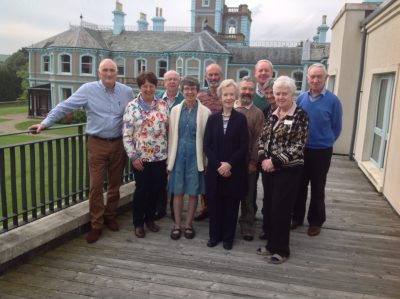The 7th me eting of the Creation Care Network took place in the Open Arms Centre at Glenvarna on 19 March 2016.
eting of the Creation Care Network took place in the Open Arms Centre at Glenvarna on 19 March 2016.
There were a number of new members at this meeting and a brief round-robin introduction was held. Each told of what they did, what their interests were and how they came to be at the meeting. It was interesting to note that 3 new members were as a result of an Eco-Congregation presentation at their Church.
The initial aim of the CCN meeting was to point people towards Eco-Congregation and its resources, and now this has perhaps expanded into giving people ideas of how and what to do about environmental issues and to encourage us all to persevere in what we are able to do. We considered what themes had been covered in previous meetings: from environmental detergents to ethical divestment from coal [and now oil and gas?] through to just being able to ask questions. Hillsborough was still thought to be the only church with an Environmental Policy [included through Health and Safety]. We also discussed ‘incinerators’ and their environmental [or otherwise] benefit and people’s concerns if they are sited in proximity to them. We all completed a questionnaire at the end of the meeting asking some questions about the role of the group etc. It was also going to be sent to those unable to attend this meeting.
Ballynure hosted a Nature Day for the local Community Association with which there are close ties. The halls were filled and the event attended by some local politicians who were so impressed that they thought this should be rolled out across South Antrim. Many contacts with exhibitors and people were made or reaffirmed and a strong environmental message was given at the event.
Regent Street was involved in a study series on missions and had a presentation by Eco-Congregation Ireland highlighting the effects of environmental damage on both the environment and human health. These themes carry over into work with young people who are very ‘me’ orientated and it is hard to get them [and older fold too] to grasp the concept of ‘the greater good’ in their actions – which are often wasteful of precious resources. They asked for basic advice on general environmental issues and how to begin to deal with them. There was much good work in the primary sector on environmental issues but an apparent dearth in secondary schools, so could the churches help to fill this void in a time when young adults are forming character shaping opinions?
The issue of council consultation on the Preferred Options Paper was raised and groups and individuals are encouraged to participate in shaping the Local Development Plan. This is an opportunity for churches and community associations to highlight environmental issues such as biodiversity and protection of local natural areas.
Kilbride shared how they began and then completed the Eco-Congregation programme as only one of two such congregations in Northern Ireland. It is significantly more popular in the South! We speculated why… They highlighted their close working relationship with the council in the adjacent church cemetery – making it herbicide and pesticide free, and their strong links with a local project in the village of Kilbride itself.
ECI and A Rocha both have excellent books on environmental ‘tips’ on what you can do individually and ECI Rep also distributed copies of the Annual Statement hot of the presses which highlighted what was going on in the island of Ireland under ECI.
We were informed that the Methodist church in 2015 resolved to divest from coal and tar sands and their ‘ethical investment body’ was to report on further divestment by 2016. There has been a groundswell amongst Methodist circuits to divest from all fossil fuels by 2018. The Methodist Church is by far the furthest along the road in this particular issue.
An update was given by the A Rocha NI representative present:
-
Relaunch of eco-congregation in England and Wales – there known as “Eco Church”.
-
NI intern coming soon. This person will be highly qualified in ecological studies. It is thought they will undertake environmental surveys for small groups such as churches where costs would otherwise be prohibitive, and they will be based at Corrymela where there is a significant interest in such work.
To end with several issues were briefly raised: the UWT Park life programme, the European Christian Environmental Network meeting in Helsinki, Tear Fund email seeking opinions on the possible demand for ‘renewable tarrifs’ – could churches be leaders in this regard?
And Finally, Christian Aid had downloadable “Questions for Politicians” as they come seeking our votes.
Date and Venue of next meeting to be confirmed.
